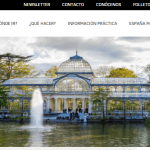The Smart Destinations Network Executive Committee, led by the Secretary of State for Tourism, Fernando Valdés, has today approved the addition of 30 new destinations, taking the total number of Smart Destinations Network members to 179: 119 destinations, 24 institutions and 36 collaborating companies.
The Secretary of State for Tourism noted the importance of the Smart Destinations Network within the current climate and the framework of programmes and initiatives that must form part of the recovery plans Spain has to present to the European Commission for its approval within the coming months.
Valdés stated that “We will be working on initiatives for tourism, focusing on ecological transition and digitalisation, in which the Smart Destinations project will be at the forefront. This is all with the aim of rebuilding trust in the destination, restarting the sector and becoming more competitive, under the premise of safe, sustainable tourism.”
The Network’s Executive Committee is chaired by the Secretary of State for Tourism and has three Vice Chairs: one organisational position held by the SEGITTUR chairman and two institutional positions held by representatives of FEMP and Red.es. It also features eight representatives from eight destinations: Benidorm, Calvià, San Sebastián, Pontevedra, Arona, Palencia, Avilés and San Bartolomé de Tirajana.
New destinations incorporated
Among the destinations added to the Smart Destinations Network today are the local governments of Águilas, Alcoy, Aller, Andújar, Barbate, Barco de Ávila, Benalmádena, Caravaca de la Cruz, Casares, Castropol, Chiclana, Chipiona, Estepona, Fortuna, Fuengirola, Hellín, Los Alcázares, Madrid, Morella, Osuna, Ponferrada, Rincón de la Victoria, Salobreña, Santa Margarida, Toledo and Villadeciervos.
The local councils of Mallorca, Comarca de la Sifra, Guadajoz and Cordoba and the Merindades Rural Development Centre (CEDER Merindades) were also added.
The Executive Committee today was joined by the secretary-general of the Spanish Federation of Municipalities and Provinces (FEMP), Carlos Daniel Casares, and the Chairman of SEGITTUR, Enrique Martínez Marín.
Smart Destination recent work
During recent months, the Smart Destination diagnostic methodology has been adapted to the pandemic, identifying requirements with a high potential to contribute towards the resumption of activity, guaranteeing the sustainability and competitiveness of destinations and turning them into specific recommendations within the structure of the Smart Destination methodology’s five categories.
Similarly, standardisation works have continued with the creation of a Manual of Best Practices for Smart Destinations in semantics adapted to COVID-19, while the Directory of Technological Solutions for Smart Destinations has been finalised and a Guide for the Reactivation of Smart Destinations has been produced.
The work the Network has been involved in include a training and education plan for all members, aimed at improving knowledge and skills, the aim of which will be providing destination managers with the skills required to improve their management.
The Smart Destinations Network, which was created on 27 February 2019, aims to promote a new frame of reference to make the Spanish tourism model more competitive.





